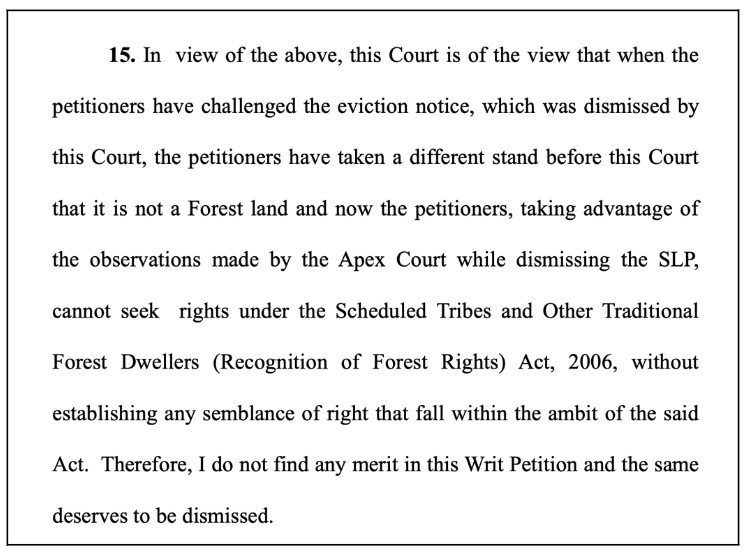In this week’s review of Court Judgments we look at Delhi High Court upholding the dismissal of a judicial officer, Karnataka High Court’s observation that a Hindu female becomes an absolute owner of the property received after partition, ITAT’s ruling that a husband is entitled to TDS credit on interest earned from amount gifted to his wife, Madras High Court’s note regarding claims relating to forest rights and Supreme Court’s Observation that an accused can’t claim right of hearing before registration of FIR.
Delhi HC: Upholds judicial officer’s dismissal for accepting favour from stranger.
A divisional bench of the Delhi High Court upheld the dismissal of a judicial officer for allegedly accepting a favour from a stranger. It remarked that a judge is always open to being judged and refused to reduce the penalty of dismissal of service.
In the case, Naveen Arora vs. High Court of Delhi and Anr, a plea was moved by the judge against a Full Court decision and an order issued by the Office of Principal District & Sessions Judge of Dwarka Courts. The petitioner has requested reinstatement along with payment of arrears and other benefits for continuity of service.
As per the details of the case, an inquiry was initiated against the said judge, after some discrepancies were found in his submissions regarding the hotel bookings by an unknown person for his and his family’s foreign travel in 2016.
As per the Inquiry Report dated 28 June 2021, a decision was taken by the High Court’s Full Court to dismiss him from service.
In his plea, the petitioner judge stated that there was a confirmation bias against him. He also highlighted that in the initial Article of Charge, the hotel bookings abroad were made by a friend or client of his younger brother and paid for by a stranger. However, in the amended Article of Charge, that name was removed as if to mean that the payment was directly made by the stranger.
Another contention was that there was no mala fide on his part as he has not withheld any information about the payments made by the ‘stranger’ and has also informed that he owed money to the ‘friend/client’ of his brother on account of the hotel bookings done abroad. He has offered money in lieu of bookings done before leaving for a trip abroad but was told that the money would be accepted upon return.
It is alleged that the person who sponsored the trip was a friend/client of the judicial officer’s wife and brother, both of whom are associated with a law firm bring run by the officer’s old collegemate.
The High court bench comprising Justice Manmohan and Justice Saurabh Banerjee, dismissed the petition. They noted that the petitioner judge has initially neither challenged the inquiry proceedings nor raised any doubts about the decision-making process followed by the inquiry officer. Hence, it can be inferred that the judicial officer followed the principles of natural justice at all the stages of inquiry. The judges also noted that the name of the stranger was not included in the initial list of witnesses filed by the petitioner and was included only after the examination of the witnesses during the cross-examination stage.
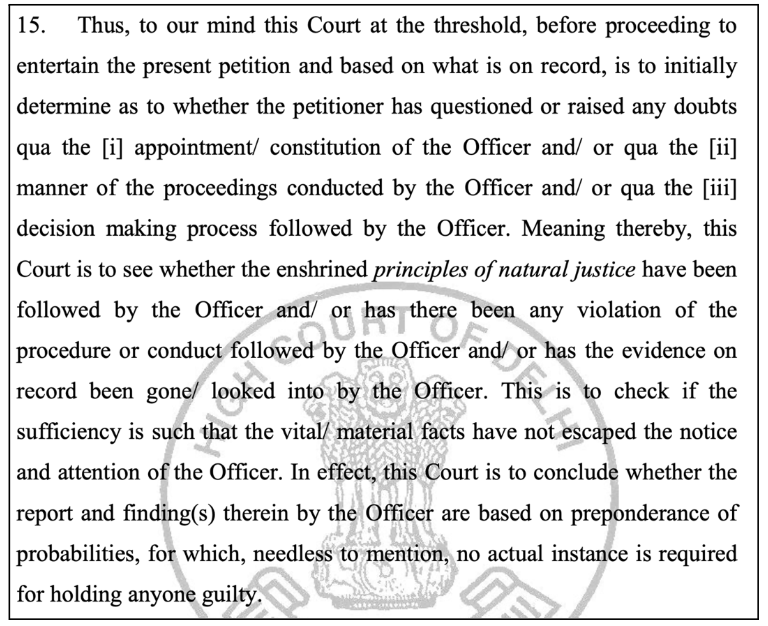
The bench noted that the facts reveal that the acceptance of the payment was indeed from a stranger and this is unbecoming of a judicial officer, especially when he is officiating. Further, the bench highlighted that the acceptance from a stranger is admitted but was not reasonably explained, which is sufficient for the petitioner to be held guilty. While acceptance in any form need not always be quid pro quo, the present petition does not inspire confidence.
It further stated that as per Article 226 of the Constitution of India, the court is not a court of appeal nor can it interfere with the findings of the inquiry officer unless they shock the court’s conscience, which is not the case here.
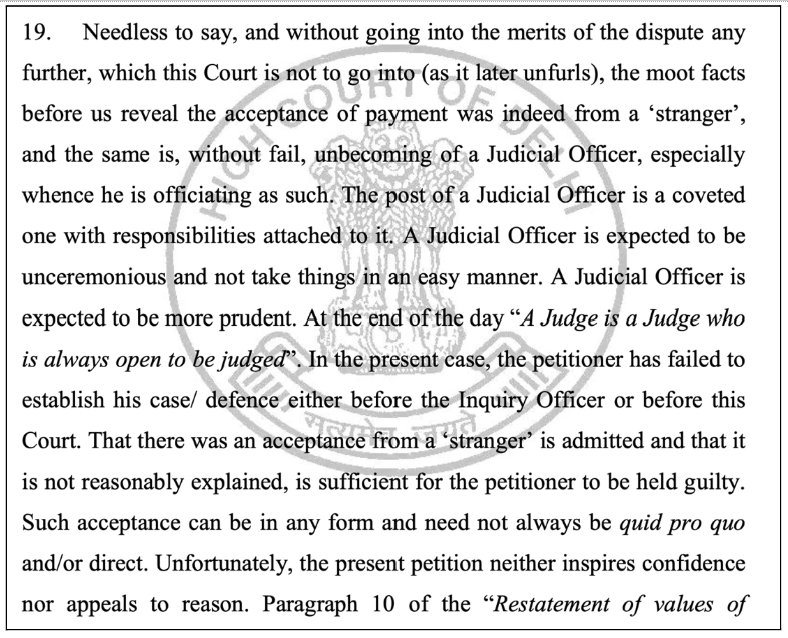
Karnataka HC: Hindu female becomes absolute owner of partitioned property, cannot devolve on siblings.
In the case, Basangouda and Muddangouda & Others, Karnataka High Court held that a female Hindu becomes the absolute owner of the property upon acquiring the property as part of the partition agreed upon by the family and this property cannot be termed as inheritance thereby reverting to siblings after death.
As per the details of the case, Eshwaramma acquired ownership of a property based on the oral partition between her father and brother. This was recorded in a memorandum of partition and registered. After she passed away, her husband filed a suit claiming that since she died childless, he would be the exclusive legal heir of that property.
He submitted that there were some discrepancies regarding the property rights as her brothers continued in the record of rights. He alleged, that the brothers are taking advantage of these hallow entries and are obstructing the peaceful possession of the said land.
The trial court dismissed this suit and the order was upheld by the first appellate court. They held that Section 15(2) of the Hindu Succession Act was attracted in this case and therefore the property allotted under the partition deed would devolve back to her siblings. Hence, he made an appeal to the High court.
The argument put forth by Basangouda was that since the property was acquired by his wife as part of the partition, she has become the absolute owner of the suit, as per Section 15(2) of the Hindu Succession Act.
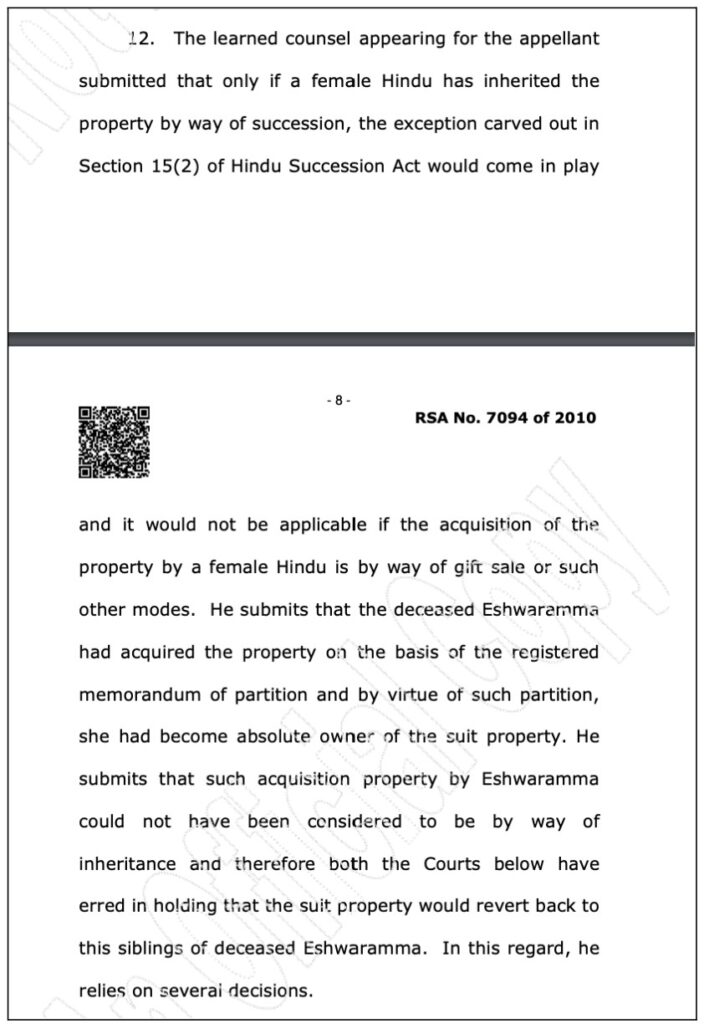
The single-judge bench agreed with the argument that by registering the memorandum of partition, Eshwaramma and her siblings have given effect to the partition entered between them. It observed that the acquisition of the property by virtue of the Memorandum of Partition by Eshwaramma cannot be construed as inheritance as per Section 15(2) of the Hindu Succession Act. It stated that ‘inheritance’ in this section was used in light of intestate succession i.e. when there is no will.
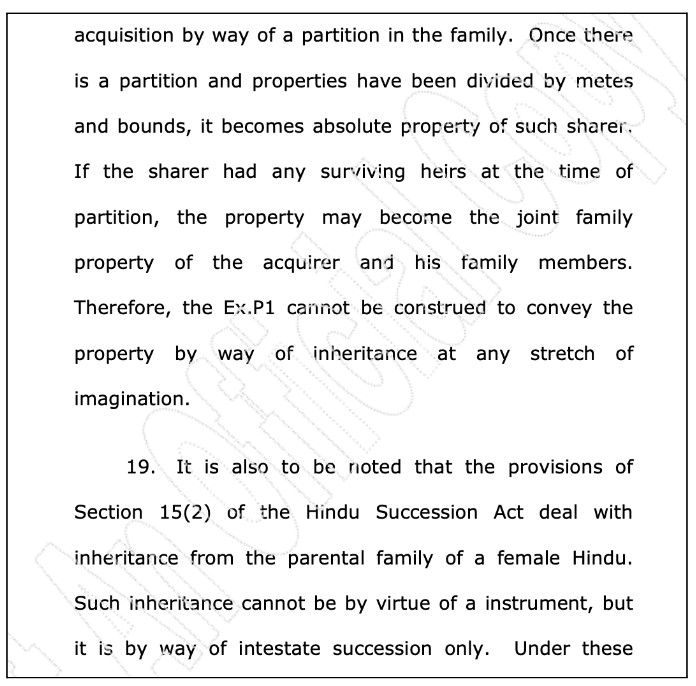
The court allowed the appeal filed by Basangouda and set aside the orders of the trial and first appellate court.
ITAT: Husband entitled to TDS credit on interest earned from amount gifted to his wife.
The Pune bench of the Income Tax Appellate Tribunal (ITAT) has ruled that the husband is entitled to TDS credit on interest earned on the amount gifted to his wife.
In the case, Anil Ratanlal Bohora Vs ACIT, the tribunal has held that in the cases where the income on which tax has been deducted is accessible to someone other than the deductee, the credit for the tax deducted shall be given to the other person rather than the deductee.
The assessee in this case filed a return declaring total income. An intimation was issued disallowing the credit for tax deducted at source on interest income. The assessee appealed against the intimation and submitted to the Commissioner of Income-tax (Appeals) (CIT(A)) that he gifted a certain amount to his wife, out of which she made deposits with the State Bank of India. She earned interest income after deducting tax at source.
Since the deposit was made out of the gift made, the assessee included proportionate interest income in his total income and also claimed credit for proportionate tax deducted at source.
CIT(A) found that provisions under Rule 37BA(2) were not followed and thus the assessee was not entitled to the credit for tax deduction at source.
After reviewing the details of the case, ITAT held that merely because the wife of the assessee did furnish a declaration in the bank, the amount of tax deducted at source cannot be allowed to remain with the bank without a corresponding credit to the person for whom the tax was deducted.
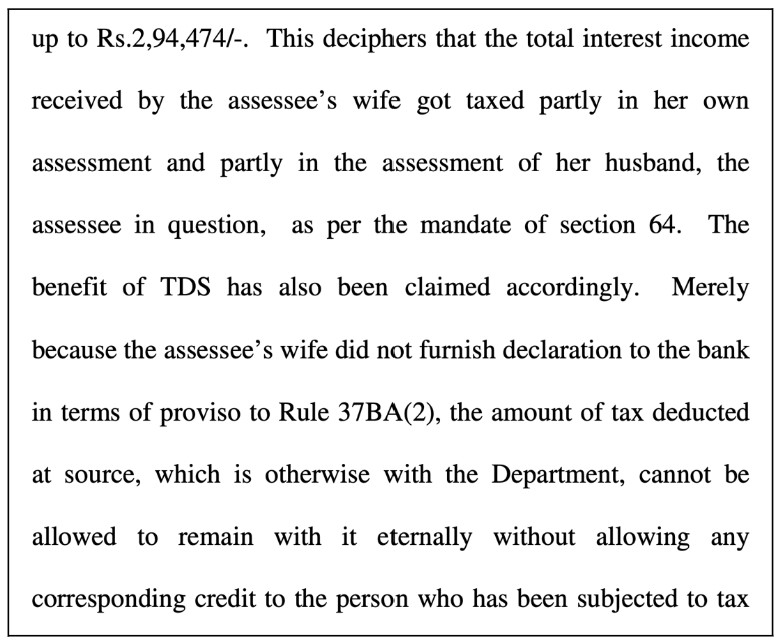
Supreme Court: Accused can’t claim right of hearing before registration of FIR
Supreme Court bench comprising Chief Justice of India DY Chandrachud and Justice Hima Kohli, held that an accused cannot claim to have a right of hearing before the registration of an FIR. They stated that the principles of natural justice are not applicable at the stage of reporting a criminal offence.
The bench made this observation in the case, State Bank of India vs. Rajesh Agarwal, while deciding the issue of whether borrowers have the right to be heard before their accounts are classified as fraudulent in terms of RBI’s Master Directions on Frauds.
The argument in this case and other similar cases was that the classification of accounts as fraud will lead to the registration of FIR, resulting in criminal consequences and hence the borrowers have the right to be heard.
Addressing this argument the bench observed that the principles of natural justice are not applicable at the stage of reporting a criminal offence. This is a consistent position adopted by the court.
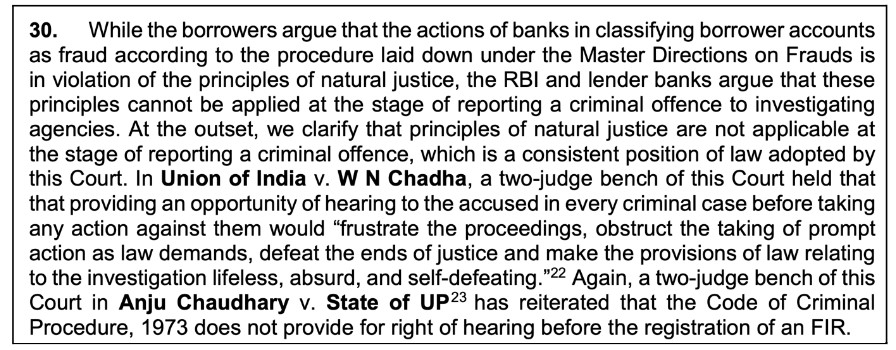
The bench has, however, held that the borrowers have a right to be heard before their accounts are classified as fraud.
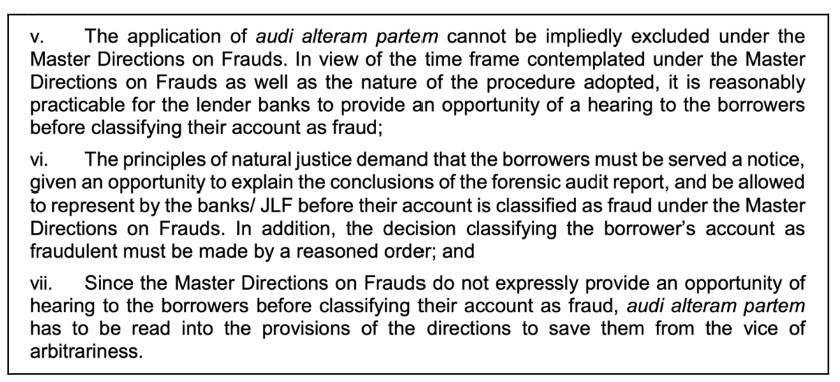
Madras HC: No forest rights merely because ancestors resided in forest, must establish sole dependency on forest.
A single judge bench of Madras High Court has noted that rights under the Scheduled Tribes and Other Traditional Forest Dwellers (Recognition of Forest Rights) Act 2006, cannot be claimed merely on the ground that the ancestors originally resided in the forests.
Refusing relief to a group of persons claiming benefit under this Act, Madras High Court stated that for claiming rights, it was necessary to establish that the persons were solely dependent upon the forest for their bona fide livelihood.
As per the details of the case, AC Murugesan and others vs. The District Collector and others, the petitioners have initially challenged the eviction notices issued by claiming that the land was not forest land. However, this was dismissed by the court.
The parties then filed a Special Leve Petition. This was dismissed by the Supreme Court but it gave liberty to the parties to claim rights under the Forest Rights Act.
In the current litigation, the petitioners claimed that they have been in possession of the land for more than 75 years and that the eviction orders were passed merely on the ground that there was no documentation to prove their possession. The contention by the petitioners was that the rights cannot be denied based solely on this ground. Another argument put forth was that their ancestors were uneducated and hence, it was the duty of the official to verify the records before taking a decision.
They also contended that merely because they are living outside the forest area, they cannot be evicted.
Meanwhile, the authorities submitted that there was no evidence for the claims made by the petitioner. Since they cannot prove their existence beyond 75 years, they cannot be considered as ‘Other Traditional Forest Dwellers’.
To be claimed as ‘other traditional forest dwellers’ under this act, it must be proved that at least three generations prior to 13 December 2004, primarily resided in the forest and were dependent on the forest for their bona fide livelihood. Under this Act, a generation implies 25 years.
Bona fide livelihood included ploughing, irrigation, and planting for the purpose of livelihood, but not for commercial exploitation of the land.
The court highlighted that initially, the petitioners have claimed that the land itself was not forest land. It was only later they claimed benefits under the Act. It noted that the petitioners have failed to establish that they primarily depended upon the forest for their livelihood. Since there was no merit in the claim, the court dismissed the petition.
